Լինելով Հայաստանում օժանդակ վերարտադրողական տեխնոլոգիաների (ՕՎՏ) հիմնադիր, ունենալով 20-ամյա փորձ, բարձր որակավորում ունեցող մասնագետներ ու ժամանակակից սարքավորումներ՝ մեր կենտրոնը հնարավորություն ունի այսօր իրականացնել անպտղության բուժման մեթոդների բոլոր տարատեսակները՝ առավելագույն արդյունավետությամբ:
ԱՄԲ բաժանմունք կարող եք զանգահարել երկ-ուրբ՝ +374 10 53 05 98
Շուրջօրյա հեռ.՝ +374 10 53 06 41, +374 99 53 06 41

Օժանդակ վերարտադրողական տեխնոլոգիաների (ՕՎՏ) բաժանմունքը հագեցած է նորագույն բարձրակարգ սարքավորումներով, որոնք թույլ են տալիս իրականացնել անպտղության բուժման բոլոր ժամանակակից մեթոդները (տեխնոլոգիաները): Բաժանմունքի բժիշկներն ունեն տարիների մասնագիտական փորձ անպտղության բուժման բնագավառում, համագործակցում են Իսրայելի, Ֆրանսիայի առաջատար կլինիկաների հետ: Բոլոր բժիշկները հանդիսանում են Մարդու վերարտադրողականության և սաղմնաբանության Եվրոպական ասոցիացիայի անդամ:
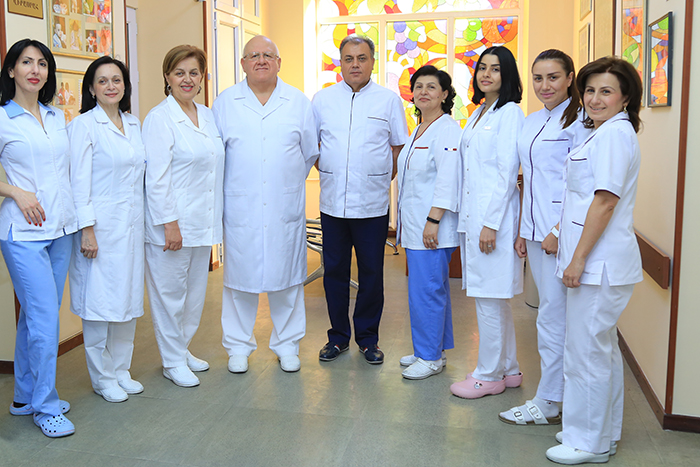
Գիտա-գործնական աշխատանքի հիմնական ուղղությունները.
Ինչպես նաև.
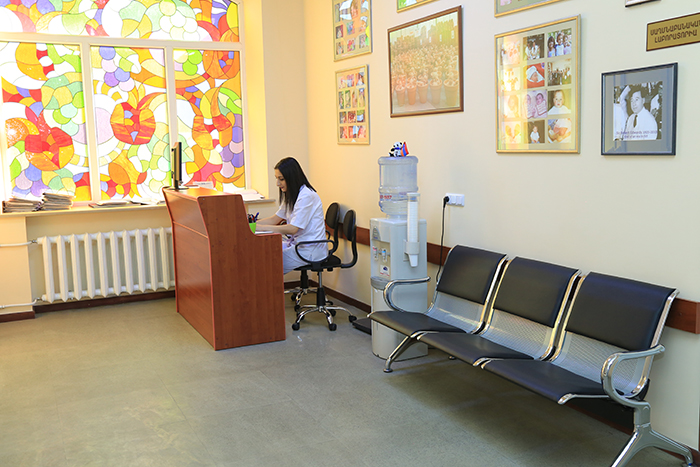
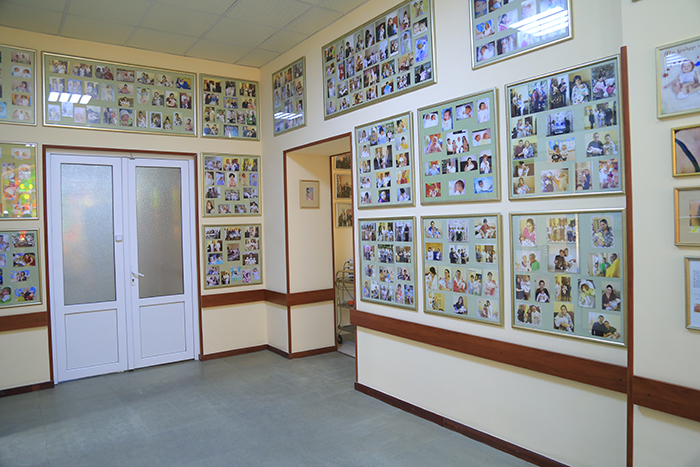
ԱՄԲ-ի ցուցումները:
ԱՄԲ մեթոդը բաղկացած է հետևյալ փուլերից:
ԱՄԲ-ի մեթոդով անպտղության բուժումից առաջ կատարվում է հիվանդայցելուների համալիր հետազոտություն:

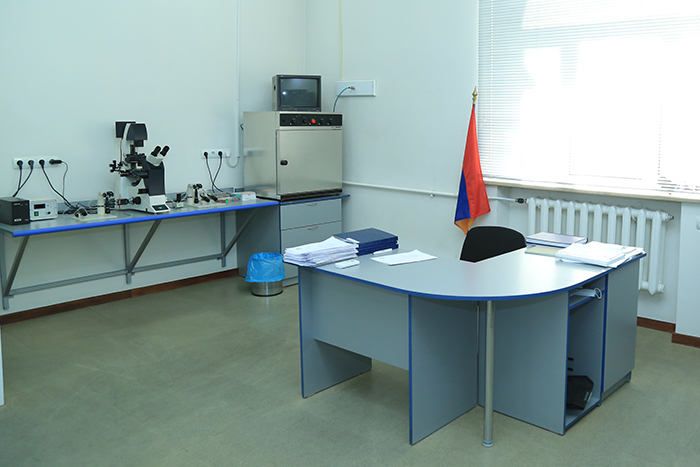
Այն իր մեջ ներառում է.
ԱՄԲ-ն պետք չէ դիտարկել որպես միանվագ բուժընթաց, այն էլ 100% արդյունավետությամբ: Ցավոք, նույնիսկ աշխարհի լավագույն կլինիկաներում այս մեթոդի արդյունավետությունը չի գերազանցում 40-45%-ը մեկ փորձի դեպքում: ԱՄԲ-ի արդյունքը կախված է մի շարք գործոններից. հիվանդայցելուի տարիքից, արգանդի վիճակից, օրգանիզմի ընդհանուր վիճակից, անպտղության պատճառից: Ուստի, ստույգ գնահատել հղիության կայացման հնարավորությունը դժվար է: Բացի դրանից, ԱՄԲ-ի հաջողությունը կախված է բժշկի հմտությունից, կլինիկայի սարքավորումներից, բուժման համար օգտագործվող դեղորայքի ընտրությունից:
ԱՄԲ արդյունավետությունը ՄՄԱՊԳՀԿ-ում կազմում է 35-40%.
Օժանդակ վերարտադրողական տեխնոլոգիաների բաժանմունքում հատուկ տեղ է տրվում սաղմնաբանության լաբորատորիային: Լաբորատորիայի հագեցվածությունը, սաղմնաբանի փորձը և պատրաստվածության մակարդակը մեծ մասամբ պայմանավորում են այս բաժանմունքի աշխատանքի արդյունքը: Մեր սաղմնաբանը՝ կ.գ.թ. Կ.Հ.Ջինանյանը աշխատում է բաժանմունքում դրա ստեղծման առաջին իսկ փուլից սկսած և ունի աշխատանքի մեծ փորձ: Նա բազմակի վերապատրաստվել է Ֆրանսիայում:
ICSI մեթոդի անցկացման ցուցումներն են հետևյալ վիճակները.
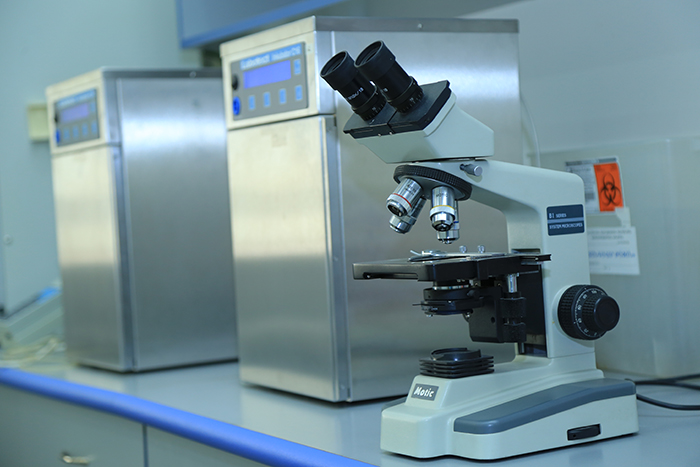
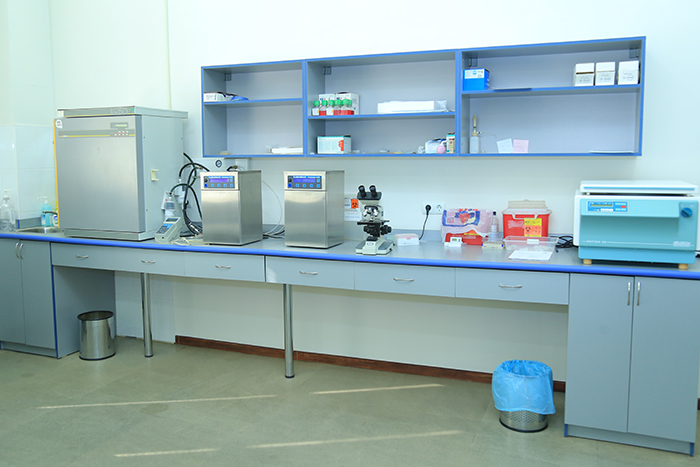
Օժանդակ hետչինգ (սաղմի թաղանթի մշակում).
Սա նոր մեթոդ է, որի օգնությամբ կարելի է հեշտացնել արգանդում սաղմի ներպատվաստումը (իմպլանտացիան): Այս մեթոդի էությունը սաղմի փայլուն թաղանթը թուլացնելն է (հատվում է թաղանթը), որը նպաստում է արգանդի պատին նրա ավելի ամուր կպչելուն։
Օժանդակ hետչինգի անցկացման ցուցումները.
Օժանդակ hետչինգը կարող է իրականացվել 3 եղանակով՝ քիմիական, մեխանիկական, լազերային:
Մեր լաբորատորիայում օժանդակ hետչինգը իրականացվում է մեխանիկական, եղանակով՝ միկրոգործիքների օգնությամբ:
Սաղմերի կրիոկոնսերվացիա /սառնապահպանում/. Այն դեպքում, երբ ԱՄԲ ծրագրի իրականացումից հետո մնում են ամուսնական զույգից վերցված լավորակ լրացուցիչ սաղմեր, զույգին առաջարկվում է դրանք սառեցնել և պահել: Սառեցված սաղմերի պահպանումը իրականացվում է հեղուկ ազոտի մեջ պահվող հատուկ նշագրված պլաստմասե անոթներում: Սաղմերի պահպանման ժամկետն անսահմանափակ է: Կատարվում է միայն լավ որակի սաղմերի կրիոկոնսերվացիա և միայն զարգացման կոնկրետ փուլում: Վատորակ սաղմերը ենթակա չեն սառեցման, քանի որ հալչելիս դրանք դեգրադացվում են (քայքայվում են): Մենք կատարում ենք սաղմերի կրիոկոնսերվացիա միայն այն դեպքերում, երբ դա անհրաժեշտ է հիվանդայցելուին և նա տվել է համաձայնություն իր սաղմերի պահպանման համար:
ՄՄԱՊԳՀԿ-ում հաջողությամբ իրականացվում են "ձվաբջջի դոնորություն" և "փոխնակ մայրություն" ծրագրերը: Դոնորական ձվաբջիջների օգտագործումը խորհուրդ է տրվում այն կանանց, որոնց սեփական ձվաբջիջները ցածրորակ են կամ չի հաջողվում դրանք ստանալ ձվարանները խթանելիս:
"Ձվաբջջի դոնորության" ծրագրի փուլերը.
Պահանջներ, որոնք ներկայացվում են ձվաբջջի դոնորներին.
"Փոխնակ մայրություն" - անպտղության հաղթահարման մեթոդ է այն կնոջ համար, որը չի կարող ինքնուրույն կրել և ծննդաբերել երեխա (արգանդի բացակայություն, սովորույթային կրելախախտ, սոմատիկ հիվանդություններ):
Այս դեպքում անպտղուղ կնոջ ձվաբջիջը՝ իր իսկ ամուսնու սերմով բեղմնավորված, տեղադրվում է մեկ այլ կնոջ արգանդի խոռոչ, որն ընդունակ է կրել և ծննդաբերել երեխային: Երեխայի կենսաբանական ծնողներն այն զույգն է, որը սաղմի ստեղծման համար տրամադրել է ձվաբջիջը և սերմը, իսկ կինը, որը կրում է երեխային, ստացել է "փոխնակ մայր" անվանումը ("օգնող", "փոխարինող" մայր):
Ի սկզբանե, որպես փոխնակ մայրեր ընտրվել են անպտուղ զույգի հարազատները, բայց վերջին ժամանակները փոխնակ մայրությունը դառնում է մասնագիտություն. կենսաբանական ծնողները վճարում են գումար առողջ կնոջը, որը համաձայն է օտար երեխայի իմպլանտացիային (ներպատվաստմանը) և կրելուն:
Փոխնակ մայրությունը ԱՄԲ-ի շրջանակներում ամենաբարդ և, բնականաբար, թանկ արժողությամբ ծրագիրն է: Բժշկագիտության մեջ ֆանտաստիկ առաջընթացի արդյունքում հնարավոր դարձած երրորդ անձի ներգրավումը երեխայի ծնվելու հարցում, հնարավորություն ընձեռեց այն կանանց, որոնց մոտ անպտղությունը նախկինում անհաղթահարելի էր, զգալ մայրության բերկրանքը:
Փոխնակ մայրության դեպքում կողմերի միջև ձևակերպվում է իրավական փաստաթուղթ (պայմանագիր):
Պահանջները, որոնք ներկայացվում են փոխնակ մայրերին.
Նախաիմպլանտացիոն (նախաներպատվաստումային) գենետիկական (ժառանգաբանական) ախտորոշումը (ՆԺԱ) կիրառվում է սաղմի մոտ քրոմոսոմային թերությունների հայտնաբերման և սեռի հետ շղթայակցված ժառանգական հիվանդությունների որոշման համար: Նախաիմպլանտացիոն գենետիկական ախտորոշումը կատարվում է բազմակի ինքնաբեր վիժումների և իմպլանտացիոն խանգարումների դեպքում՝ 37-ից բարձր տարիքի կանանց մոտ: Նախաիմպլանտացիոն գենետիկական ախտորոշման էությունը կայանում է նրանում, որ հնարավորություն է ընձեռվում մինչ արգանդի խոռոչ տեղադրելը որոշել սաղմի գենետիկ (ժառանգական) կարգավիճակը, ընտրել առավել կենսունակ սաղմեր, և այդպիսով ոչ միայն կանխել ծանր քրոմոսոմային ախտաբանությունները, այլև ընդհանրապես բացառել իմպլանտացիայի և հղիության կայացման հնարավորությունը:
Արհեստական սերմնավորում ամուսնու (ԱՍԱՍ) կամ դոնորական սերմով (ԱՍԴՍ).
ԱՍԱՍ-ի բուժմիջամտության էությունը կայանում է նրանում, որ սաղմնաբանական լաբորատորիայում ամուսնու նախապես մշակված սերմը ներարկվում է կնոջը ներարգանդային ճանապարհով: Սերմնավորումը կարելի է անցկացնել ինչպես բնական ցիկլի ժամանակ, այնպես էլ խթանված օվուլյացիայի (ձվազատման) ֆոնի վրա: Ամեն դեպքում ԱՍԱՍ-ի կատարման համար պետք է ստուգվի արգանդափողերի անցանելիությունը, քանի որ սերմնավորման ժամանակ, ինչպես բնական ճանապարհով հղիանալու դեպքում, բեղմնավորումը կատարվում է արգանդափողում:
ԱՍԱՍ-ի ցուցումները.
Սերմի դոնորություն. Դա ծրագիր է, որը թույլ է տալիս երեխա ունենալ այն ընտանիքներին, որտեղ առկա է բացարձակ տղամարդկային անպտղություն կամ այն միայնակ կանանց, ովքեր չունեն սեռական զուգընկեր:
Սերմի դոնորներ կարող են լինել ֆերտիլ (բեղմնունակ) սերմ ունեցող 20-40 տարեկան առողջ տղամարդիկ:
Սերմի դոնորների հետազոտության պարտադիր ծավալը իր մեջ ներառում է.
Սերմի կրիոկոնսերվացիա (սառնապահպանում). Մեր կլինիկայի պայմաններում հնարավոր է ամուսնու և/կամ դոնորի սերմի կրիոկոնսերվացիա՝ (սառեցում) դրանց հետագա օգտագործմամբ անպտղության բուժման ծրագրերում, օժանդակ վերարտադրողական տեխնոլոգիաների օգտագործմամբ: Սերմի սառեցումը կատարվում է հեղուկ ազոտում՝ հատուկ սարքավորումների օգնությամբ: Սառեցված վիճակում սերմը կարող է պահպանվել մի քանի տարի: Սերմի պահպանման լավագույն ժամկետը համարվում է 3 տարի, քանի որ այդ ժամկետն անցնելուց հետո սերմնաբջիջների բեղմնունակությունը նվազում է:

Գեորգի Գրիգորիի Օկոև
մանկաբարձ-գինեկոլոգ
բ․գ․դ․, պրոֆեսոր
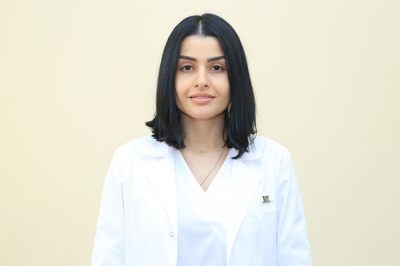
Անժելա Պավլիկի Հարությունյան
էմբրիոլոգ
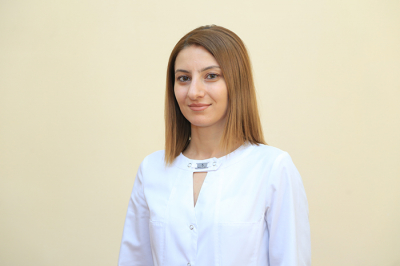
Արմինե Գագիկի Սայադյան
մանկաբարձ-գինեկոլոգ

Լուսինե Զորիի Բալայան
մանկաբարձ-գինեկոլոգ, ռեպրոդուկտոլոգ
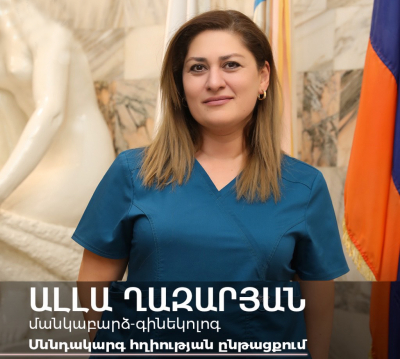
Հղիության ընթացքում բալանսավորված սնունդը պետք է ապահովի մոր էներգիան, պտղի ճիշտ աճն ու զարգացումը, ինչպես նաև կանխի անեմիան...
Կարդալ ավելին»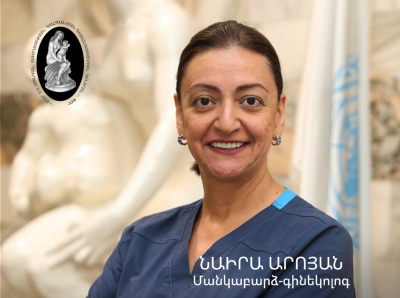
Հղիության սովորութային կրելախախտը վիճակ է, երբ կնոջ մոտ արձանագրվում են հղիության կրկնվող ինքնաբերական ընդհատումներ: Սովորաբար այս տերմինը կիրառվում է, երբ լինում է 2 կամ ավելի հաջորդական......
Կարդալ ավելին»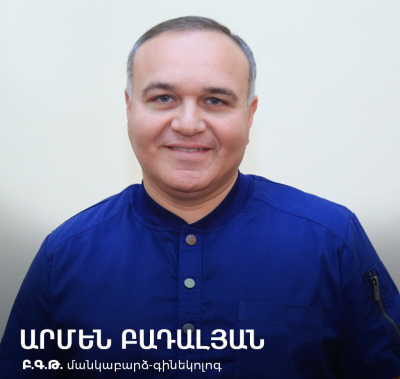
39 տարեկան կինը, ով շուրջ 4 տարի տառապել է անպտղությամբ, դիմել է մեր կլինիկա։ Կատարվել են......
Կարդալ ավելին»